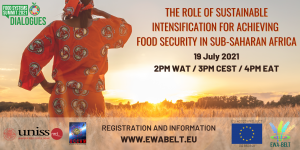الملاحظات التقييمية الرسمية على الحوارات إلى قمة الأمم المتحدة للنظم الغذائية لعام 2021
نوع الحوار
بدعوة من
لغة فعالية الحوار
التاريخ/الوقت
إلى:
نطاق التركيز الجغرافي
التنسيق
يُرجى مراجعة التفاصيل أدناه للحصول على معلومات التسجيل إذا كانت متوفرة أو الاتصال بمنظم الحوار إذا كنت ترغب في الحضور.
القيّم
الوصف
By 2050, the world’s population could grow to 9.7 billion, food demand is expected to increase by 50% and global demand for grains such as maize, rice and wheat could increase by 70%.
In Africa, food insecurity has been raising in recent years and the continent is not on track to eliminate hunger by 2030. Population is growing rapidly and needs an abundant supply of affordable and nutritious food. On the other hand, stakeholders such as small-scale farmers do not have the right incentives and access to investments for raising productivity. At the same time, agriculture is a major contributor to the balance of payments for African economies, and needs to meet both domestic demand as well as maintain its place in international trade.
How can we meet the food and nutrition demands of a rising population, without negative environmental and social consequences? (Summit Action Track 1 and 4).
Sustainable intensification is an approach that uses innovations to increase productivity on existing agricultural land with positive (or at least not detrimental) environmental and social impact. Both words, “sustainable” and “intensification,” carry equal weight.
The ambition for Sustainable Agricultural Intensification (SAI) can be reflected also in the Sustainable Development Goals, in particular: SDG 15 – Life on Land, which aims to sustainably manage forests, combat desertification, halt and review land degradation and halt biodiversity loss; and SDG2 – Zero Hunger, which seeks to ensure sustainable food production systems and implement resilient agricultural practices that increase productivity and production, help maintain ecosystems, strengthen capacity for adaptation to climate change, extreme weather, drought, flooding and other disasters and that progressively improve land and soil quality and maintain genetic diversity.
If this ambition is to be realised, the efficiency with which existing resources are used has to be enhanced to ensure ecosystems services are maintained. Sustainability also requires ensuring social equity in the productive and environmental benefits from SAI, otherwise poorer sections of the farming population and women farmers risk being left behind by the promotion of intensification (Natural Resource Institute-NRI)
Sustainable intensification can be achieved with a range of methods.
The Dialogue will discuss with representatives of Research and Academia, Civil Society and Farmers from Europe and different Sub-Saharan African Countries such as Burkina Faso, Sierra Leone, Tanzania, Kenya, Ethiopia and Ghana, the challenges and the ways in which farmers in Sub-Saharan Africa can increase production of crops per unit of land, conserve or enhance important ecosystem services, improve resilience to shocks and stresses, while fostering livelihoods, equity and social capital to ensure a food security system for all.
This Independent Dialogue is convened within the framework of EWA-BELT, a EU Horizon2020 Project (GA 862848).
Important remarks: Please note that this Independent Dialogue will take place in accordance with the Food Systems Summit Principles of Engagement as well as in compliance with the Chatham House Rule: Participants are free to use the information received, but neither the identity nor the affiliation of the Speaker(s), nor that of any other Participant, may be revealed.


